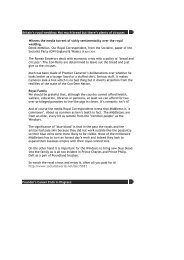The Cape of Good Dope? - Centre for Civil Society - University of ...
The Cape of Good Dope? - Centre for Civil Society - University of ...
The Cape of Good Dope? - Centre for Civil Society - University of ...
You also want an ePaper? Increase the reach of your titles
YUMPU automatically turns print PDFs into web optimized ePapers that Google loves.
<strong>The</strong> “Crack”<br />
Many thousands <strong>of</strong> street kids (have) little alternative but to enlist in the<br />
cryto-Keynesian youth employment programme operated by the cocaine<br />
czars . . . the only rational option open to youth – at least in the<br />
neoclassical sense <strong>of</strong> individual economic choice – was to sell drugs.<br />
Indeed as power resources in the community have generally declined,<br />
ghetto youth, refusing simply to become ‘expendable’, have regrouped<br />
around one social organisation that seems to give them clout: the street<br />
gang.’ (Davis 1988:51-52)<br />
In Soweto students took on the gangs and routed many <strong>of</strong> them in 1976, <strong>for</strong>cing a<br />
decline in gang activity and fostering a politicised ‘alternative youth culture’ (Glaser<br />
2000:179). But the challenge did not happen on the <strong>Cape</strong> Flats, allowing gangs to keep<br />
growing in their attraction to young people and increasing their power in communities.<br />
In fact, there are stories that MK units had to negotiate with the <strong>Cape</strong> Flats gangs <strong>for</strong><br />
safe passage in the 1980s.<br />
<strong>The</strong> proliferation <strong>of</strong> gangs and crime was facilitated by apartheid policing: ‘Black<br />
people were policed <strong>for</strong> control and not crime prevention, the police aimed to prevent<br />
crime in white areas not by reducing it in black areas but by preventing the<br />
uncontrolled movement <strong>of</strong> black people, who were considered to be its perpetrators.<br />
Thus the police spent an inordinate amount <strong>of</strong> resources on arresting people <strong>for</strong><br />
apartheid administrative <strong>of</strong>fences… but seldom confronted criminal violence in the<br />
township themselves’ (Shaw 2002:1).<br />
By 1994, the two most influential gangs were the Hard Livings and the Americans<br />
spread out across the <strong>Cape</strong> Flats into cells <strong>of</strong> 15-20 members. <strong>The</strong> Americans had a<br />
loose alliance with the Sexy Boys while the Hard Livings were allied to a myriad <strong>of</strong><br />
smaller gangs (Schärf and Vale 1996:31).<br />
In the 1980s, gangs like the Hard Livings were still limited to their neighbourhood.<br />
Money, in addition to drugs, came from gambling and extortion. <strong>The</strong> gangs did not<br />
only rely on naked <strong>for</strong>ce and fear to embed themselves in communities. Often they<br />
would distribute food parcels to the needy and give assistance at funerals. Many in the<br />
community would also rely on the gangs to buy ‘cheap’ television sets, VCRs and the<br />
like. <strong>The</strong>re were cruder tactics too. Rashaad Staggie, <strong>for</strong> example, would drive through<br />
the streets and throw money from his car (Kinnes 2000:7).<br />
<strong>The</strong> fall <strong>of</strong> apartheid met neo-liberal globalisation, with its accompanying paradigm <strong>of</strong><br />
deregulation, dropping <strong>of</strong> exchange controls and privatisation, facilitating the<br />
porousness <strong>of</strong> borders. And so the flow <strong>of</strong> illegal substances was facilitated in South<br />
Africa.<br />
<strong>The</strong>re were also other factors at play. <strong>The</strong> transition saw the coming together <strong>of</strong> 11<br />
<strong>for</strong>mer police <strong>for</strong>ces into the SAPS, providing all kinds <strong>of</strong> co-ordination problems.<br />
This was exacerbated in the Western <strong>Cape</strong> by the fact that the police were controlled<br />
by the New National Party (NNP) and the Department <strong>of</strong> Justice by the ANC; the lack<br />
<strong>of</strong> co-ordination was compounded by politicking. So <strong>for</strong> example after a doctor was<br />
killed on the <strong>Cape</strong> Flats, the ANC Minister <strong>of</strong> Justice, Dullah Omar, commented that<br />
17
















